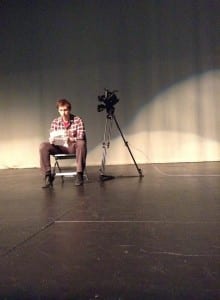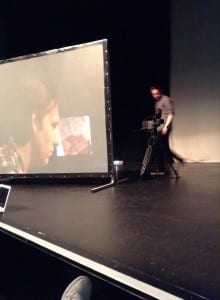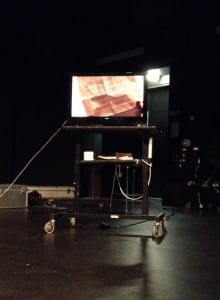The process we are in at the moment seems a bit playful and unstructured as we are not necessarily learning lines or blocking scenes but it is useful and important all the same.
By purely experimenting with materials produced, such as short scenes or a monologue, even an idea with the camera, we are slowly but surely making progress.
The beauty of producing a fragmented show enables you to play around with different ideas and themes. Things we experiment with in these sessions can all be brought forward into the final show, we can alter them and expand on them to produce something with meaning and of worth. Cutting and stitching pieces together is what will make our show. It has been and will be of worth to discuss what works and how we could expand what works to start producing full scenes.
Monthly Archives: March 2015
GodMachine/Notes on a Conspiracy (Rough Sketch)
When I was 6 it all changed. People had mobile phones and computers before then, but it was as if something had infected us – suddenly they were cheaper, easier to use and interact with. They became hip across all ages and cultural backgrounds. We became obsessed.
And that obsession grew like a cancer. We didn’t just want them anymore; we needed them like a drug. It became our reason to go to work, to earn money, to perform better at school. Somewhere along the way, we stopped using the machines, and the machines started using us.
God is in the machine. All’s right with the world.
The government’s been in bed with the entire telecommunications industry since the Forties. They’ve infected everything. They can get into your bank statements, your computer files, e-mail, listen to your phone calls, read your texts and voicemail. Every wire, every airwave. The more technology you use, the easier it is for them to keep tabs on you.
It’s a brave new world out there. At least it better be.
I used to work for the N.S.A. I was a communication analyst. Listening to international calls, calls from foreign nationalists. Fort Meade has acres of mainframe computers underground. You’re talking on the phone to your wife and you use the word, “bomb,” “president,” “Allah,” any of a hundred key words, the computer recognizes it, automatically records it, red flags it for analysis; that was thirty years ago.
You know the Hubble Telescope that looks up to the stars? They’ve got over a hundred spy satellites looking down at us. That’s classified.
In the old days, we actually had to tap a wire into your phone line. Now with calls bouncin’ around on satellites and off of cell-phone masts, they just snatch ‘em right out of the air.
A Peek Behind the Curtain.
SCENE X.3
A man stands, staring at a camera for an uncomfortably long time. He is not visible; we only witness his actions through the screen.
After a while, he speaks, he is suppressing anger.
ONE. Always watching. Never falter, never fail. Your obedient eye watches me day in and day out. Why? In case I do something you don’t approve of? What happens then?
Pause.
You’ve watched me grow. You’ve seen my life. My life on tape. You can fast forward through the boring bits and replay the treasures. You can delete my life like it is nothing, like my life meant nothing. Is that what you did to him?
Pause
You don’t let us talk about it when people disappear, but I have to. You took him away and deleted his existence from everything. All because he questioned you? The G.O.D doesn’t approve and that means they deserve to be deleted. Why?
Pause
You should have taken me instead.
Pause
He was my brother.
Pause
Silence. Again, silence. Every day, silence. This omnipresent being without a single thing to say. But you’re still here. Watching.
Pause
Take me instead.
Pause
I said… take… me… instead.
Pause, then screaming.
TAKE ME!
ONE squares up to camera, nose to lens, before backing off and sitting down.
Pause.
I have a message for the G.O.D… You can take away my friends, my family, my life, but you will never take away my sanity. You can try. You can lock me away with nobody to talk to. You can ignore me. You can never respond. But I will always be myself and you will not take that away from me.
Pause.
He moves to a box and pulls it out, a gun, some tape.
The G.O.D know.
You won’t change me. No matter what you try to do to me. You’ve taken everything I love away, and I assume… I’m next.
No.
He takes the tape and covers the camera lens with it. Now we only hear his voice and sound.
I want you to know; this won’t last. You won’t last. The truth will come out and the people will rebel. You can’t expect the world to accept this level of intrusion. You can’t do that. People’s private lives are what make them human. What you see isn’t human, it’s fake. It’s constructed. It’s a play.
All the world’s a stage, as it were. But this… this is a peek behind the curtain.
A gun shot is heard.
Surveillance Footage A-1
Surveillance Footage A-1
Subject enters frame from the right, inspects dishwasher, places half-eaten loaf of bread in cupboard. He then goes to the right, exits outside and smokes a cigarette, periodically spitting. At 2:04 and 2:11 he seems to overhear something from the adjacent yard; he continues smoking.
At 3:22 he shrugs to disentangle himself from a thorny hedge, inspects loose branch before discarding it; smokes throughout.
After disappearing out of view to the left at 4:23 and returning at 4:42, he stubs out his cigarette and returns inside. At 5:03 he runs himself a tall glass of water from the kitchen faucet and drinks it in three long gulps, spitting out the last mouthful in the sink. He exits to the right of frame at 5:22.
Camera in Utopia
So whilst googling survalience and CCTV i have found this from an atricle. Its a really intresting moral look regarding societies usage for CCTV.
“Imagine that right after briefing Adam about which fruit was allowed and which forbidden, God had installed a closed-circuit television camera in the garden of Eden, trained on the tree of knowledge. Think how this might have changed things for the better. The serpent sidles up to Eve and urges her to try the forbidden fruit. Eve reaches her hand out – in paradise the fruit is always conveniently within reach – but at the last second she notices the CCTV and thinks better of it. Result: no sin, no Fall, no expulsion from paradise. We don’t have to toil among thorns and thistles for the rest of our lives, earning our bread by the sweat of our brows; childbirth is painless; and we feel no need to wear clothes.
So why didn’t God do that and save everyone a lot of grief? True, surveillance technology was in its infancy back then, but He could have managed it, and it wouldn’t have undermined Eve’s free will. She still has a choice to make; but once she sees the camera she’s more likely to make the right choice. The most likely explanation would be that God doesn’t just want Adam and Eve to make the right choices; he wants them to make the right choices for the right reasons. Not eating the forbidden fruit because you’re afraid you’ll be caught doesn’t earn you moral credit. After all, you’re only acting out of self-interest. If paradise suffered a power cut and the surveillance was temporarily down, you’d be in there straight away with the other looters.
So what would be the right reason for not eating the fruit? Well, God is really no different than any other parent. All he wants is absolute, unquestioning obedience (which, by an amazing coincidence, also happens to be exactly what every child wants from their parents.) But God wants this obedience to be voluntary. And, very importantly, He wants it to flow from the right motive. He wants right actions to be driven not by fear, but by love for Him and reverence for what is right. (Okay, He did say to Adam, “If you eat from the tree of knowledge you will die” – which can sound a little like a threat – but grant me some literary license here.)
Moral philosophers will find themselves on familiar ground here. On this interpretation, God is a follower of the eighteenth century German philosopher Immanuel Kant. (This would, of course, come as no surprise to Kant.) According to Kant, our actions are right when they conform to the moral rules dictated to us by our reason, and they have moral worth insofar as they are motivated by respect for that moral law. In other words, my actions have moral worth if I do what is right because I want to do the right thing. If I don’t steal someone’s iPod (just another kind of Apple, really) because I think it would be wrong to do so, then I get a moral pat on the back and am entitled to polish my halo. If I don’t steal the iPod because I’m afraid of getting caught, then I may be doing the right thing, and I may be applauded for being prudent, but I shouldn’t be given any moral credit.”
Westacott, E (2010) ‘Does Surveillance Make Us Morally Better?’ philosophynow.org [Accessed on: 16th March 2015] https://philosophynow.org/issues/79/Does_Surveillance_Make_Us_Morally_Better



